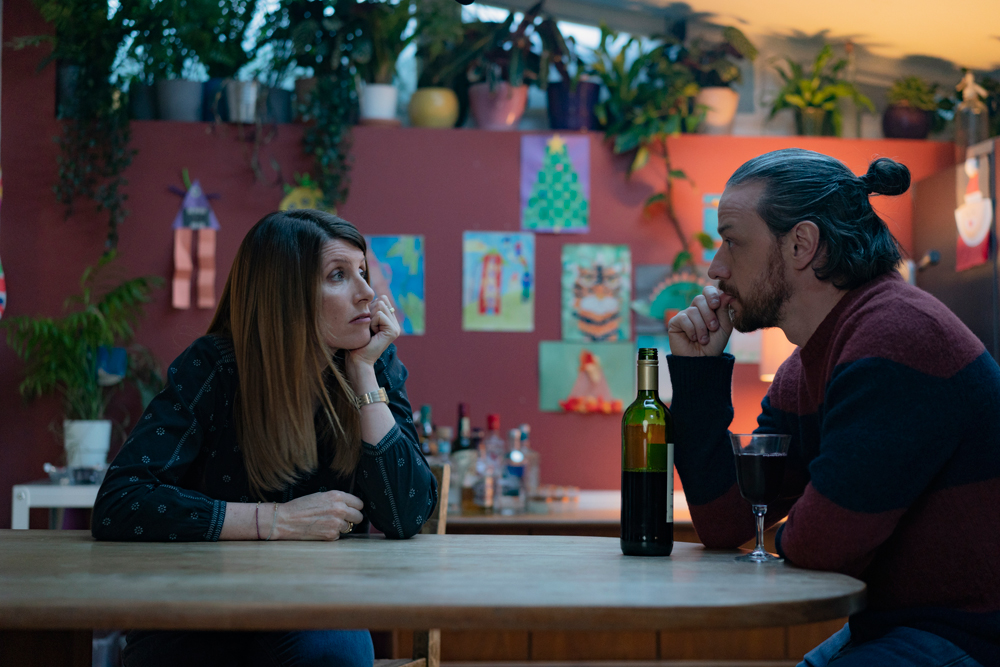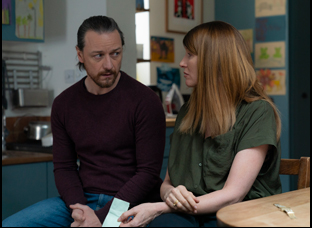As if the coronavirus was enough of a concern over the better part of the past two years, the time in quarantine created an additional set of anxieties for families that were unused to spending time with one another in such close quarters without the ability to breathe inside one’s home after being advised against it outside. With fights commencing in homes around the world, Dennis Kelly had the spark of an idea as he is want to do during tough times, seizing upon success as a playwright to create provocative dystopian TV miniseries such as “Utopia” and “The Third Day,” imagining a couple who likely have only stayed partners as a result of their bickering, complete opposites in their political views and others who show their affection for one another in barbed insults. In “Together,” you’re led to believe at first that the unnamed pair, played by Sharon Horgan and James McAvoy, continue to celebrate anniversaries with one another for the sake of their son Artie, but what Kelly finds is a more abstract and complex connection, with both surely amused by their ongoing squabble when to agree would be boring, but also a recognition that an argument requires passionate engagement that they might be incapable of otherwise.
With two characters who need not hide their disdain from one another, even when they know the other can’t easily leave the room, “Together,” guided under the steady direction of “Billy Elliott” helmet Stephen Daldry, opens up a dialogue on an array of issues beyond the ones McAvoy and Horgan’s husband and wife are intimately facing, staring into the frustrations of a world that seemed to have fell off its axis in the wake of a crippling virus and disagreement over the proper response revealed how precarious all societal structures actually are, ironically uniting those in disbelief over how such systems could collapse and those that didn’t believe in them in the first place. In “Together,” the institution of marriage may not be all that different, rife with irrationality that only may be questioned in times of crisis and Kelly, along with a pair of wickedly sharp actors in Horgan and McAvoy, hit audiences where they live beyond the occasional breaking of the fourth wall that invites them into their home. With the film now hitting theaters in the U.S. after becoming a hit across the pond, Kelly spoke about how he was inspired to write during the pandemic, crafting a narrative that was responding in real time to the emotions of the moment and the gift of having the space to be creative in otherwise dire circumstances.
I didn’t really want to write anything about lockdown. To be honest, none of us wants to do anything about lockdown — I don’t think Stephen [Daldry] wanted to direct anything about this lockdown, [or] Sharon and James, but once I started writing it, it just got a momentum of its own. It happened very quickly, I wrote it in the first lockdown of last year and then I brought it to Sonia Friedman, who was a producer on it, and she took it to Stephen, and then it happened ridiculously fast. The thing I did just before this took nine years, this took less than a year. It’s just insane.
It’s interesting to hear you say you wrote it during the first lockdown when you capture the emotional cycle of going through this pandemic as it continued to unfold even to this present moment. Did you write it all in one go or were you capturing things as you were feeling them?
It wasn’t in one go, but I had to write things quite quickly because I was very busy with other stuff. There’s a whole bunch of stuff that people are actually paying me to write that I should be writing, not this side project. [laughs] So I knew the only way I could write it is to sit down and write it quite intensely, and I wrote it all by hand. I write plays and films and TV, but I tend to write plays [only] by hand, so that was quite unusual for a screenplay to make you sit down with a pen and a pad and just write this thing out. I think that’s why it’s got a sort of a theatery feel to it in some ways. I just spurted these out as quickly as I could, but then I’d go back and rewrite them and rewrite them. The first draft probably took about a month or six weeks, and then I revisited it and found later on, as circumstances had changed, I had to also change the theme. Not just in the facts of it, but actually in the feel of it.
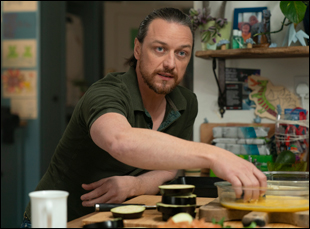
That was always there. I thought it looks more like a play because it breaks the fourth wall, but somewhere in my guts, I felt like this might not be a play, this might be a film, but I had no idea what it was as it was writing it. And I just kept writing it. There were moments where I just thought, this can’t be for TV or film because it just can’t, but then I’m starting to look at it and go, but this can’t be for theater either for various reasons and I felt like I didn’t really care. I heard the two characters very clearly in my head, and once I heard them, it felt like I was on the rind, really and I just carried them on. And then I looked at it at the end and thought, “What the fuck is this? And who are the people to do it?” [laughs]
You understand when you’re watching it how these two people are still with each other with all their differences – or because of them, but was it difficult at first to figure out what kept them together?
Yes, but I think that was what’s useful about that is when you’re making things, the worst thing anyone can ever say to you is, “I think what they’re doing is out of character.” Because actually the reply to that, is “Of course it’s out of character, but that’s why we’re watching you. You don’t want to watch this stuff that they’re doing in character, you want to watch the stuff that they’re doing out of character.” So being in this weird moment and then being complete opposites was more what allows you to dig into them and find out why they are together. The fact that either of them have that opening thing where they’re basically saying that they disgust each other, you think, “Okay, well, the job of the rest of this piece is to find out what the hell they’re doing together.”
It was interesting to hear you consulted with virologists when the lockdown is the premise, but it largely exists as this amorphous weight on the characters. What did you want the presence of the pandemic to be?
I was quite cautious when I was doing research for it, but I didn’t want to know anything the characters didn’t, so I wasn’t going to interview any politicians or have access to anything that they didn’t have. The only exception to that was I did have a quick quiet chat with a virologist who was really useful. I don’t think he told me anything that I probably couldn’t have figured out if I had been a bit smarter. but the pandemic shaped everything and it’s such a strange thing to write through and about because there is no event [like it] that I can think of in shared human history because it is so global. You can talk about the huge world wars we had or the plague, [which] only hit a certain area of Europe, or even the financial crash of 2008, but there were people it didn’t touch, and the pandemic has touched pretty much everyone. So it was daunting writing about something so big and I figured the only way of doing it was to actually write quite small, about two people. “Together” isn’t a chronicle of the pandemic, it’s a chronicle of what happened in that house during the pandemic, and hopefully that allows you to talk about larger issues.
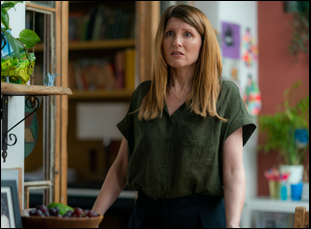
She’s probably my best friend, Sharon and if really shit things happen in my life, Sharon is the person that I would go to. We started out together, and I wouldn’t be a writer if it wasn’t for Sharon, I know that hands down, and I’ve worked with Sharon on a number of things, so it was strange in one way because normally when I’ve worked with Sharon, she’s been a writer on it and this was the first thing in our professional lives where I was the writer and she was the actor. But it was actually really very easy to get on with Sharon and it was a really collaborative process. I was in all the rehearsals and on set all the time, and Stephen, the director, is very collaborative. I think you’ve got to respect what people do and as long as you are, he’s very open to us all talking about stuff and they’d tell me things that they thought weren’t working and I’d either change them or tell them that they were crazy and we’d argue about things, but it was always a really positive thing.
Was there any ways this came to life that were unexpected?
Probably tons, but I don’t know if I can think of any [specifically]. Both James and Sharon are instinctively good actors and they have a lot of experience, so what you tend to do is you see them say stuff and you realize, “Oh shit, I need a lot less [words], they’ve given me loads more than I need.” That happens all the time. And Artie, the son, was interesting because he wasn’t originally in it [physically]. I hadn’t envisaged that he would be in it, but Stephen said, “I think we should put Artie in it,” and once he was there, it became more and more important [because] you don’t see much of him, but in some ways it’s also his story.
This would seem to split the difference between a stage production and a movie production given how it moves about a single space and I imagine with COVID protocols, workshopping it might’ve been different. What was the process like of rehearsal?
We basically rehearsed as long as a show. I’ve been on TV things where no one rehearses anything — they block it out and they shoot. But with this, we rehearsed everything for a long, long time and it was really important, especially that [first] scene [that’s] not actually one take, but all the takes were created in one take, so that’s 13 minutes of screen time. It’s quite a lot for the actors and the words come fast and thick. They don’t mess around. So [the actors] had a huge amount of learning to do, but also there was a massive amount of blocking, so every time the camera’s moving with [the actors], a whole bunch of people are shuffling along around the sound guy in this tiny space, because it was someone’s house we were shooting in. All of that was amazing and you wish that people could see the crazy stuff that was going on over the back.
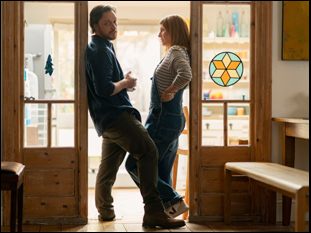
I loved it straight away. You get a say in these things because the people you’re working with are decent people and say, “What do you think about this?” And the moment I saw that I just said, this is perfect because it just felt like it was big enough for us to do what we needed to do, it was interesting enough for them to be interesting without being too interesting. And weirdly, on a socioeconomic level, it didn’t make them super rich, but we could believe that he had his own business, so I loved that and thought it was a lovely place to shoot.
This seems like a triumph on many fronts, but particularly when it seems like you made something at a time when the odds seem so stacked against being creative generally. What’s it like to have it now?
It’s absolutely incredible, and probably the most moving thing I’ve ever done. People are always going to say that to you, “Oh my God, it was an amazing script” and “Everything is fantastic.” But it genuinely was. It was very difficult. It was really hard to get it done. But I remember at the end of it, Stephen gave a speech upon wrap — not at the wrap party because there was no wrap party — but when we were finished and got the last shot in, he turned around to everyone and said, “Before you go, I just want to say, thank you. And just remember we’ve all done something here.” And you could feel everyone looking at each other and it felt like a real privilege. We got to talk about this [lockdown] and we got to process it, and that has been a really profound thing.
Then when it went out here in the UK, the response was just extraordinary. I’ve never really experienced anything like it because just it’s not just the level of response, but it’s who it’s coming from — people who have been through some really, really bad things. And everyone’s going, “Oh, we’ve got a vaccine, great I guess we’ll move on. Let’s all move on.” But there’s a lot of dead people and a lot that still have got lung COVID, and a lot that don’t have their grandparents or their parents and they feel forgotten. If this was an outbreak of Legionnaire’s disease in upstate New York, it would have been all over the news and those people would have been given grief counseling, and we would have talked about it because of the scale of this. But there’s a whole bunch of other stuff that’s been forgotten and to be able to, in some way, speak about it was just amazing.
“Together” opens on August 27th in select theaters. A full list is here.




